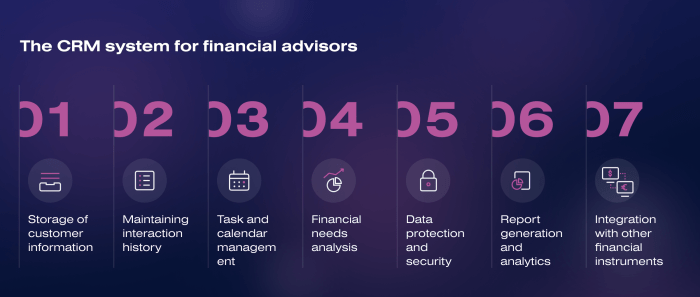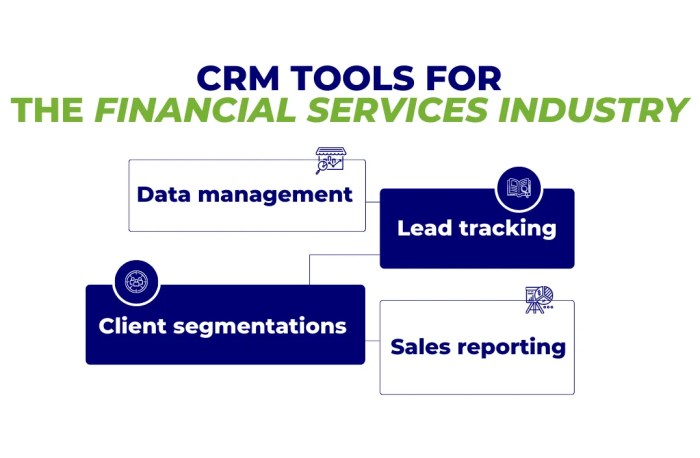In today’s competitive financial landscape, efficiently managing client relationships is paramount for success. Financial advisor CRM software offers a powerful solution, streamlining operations and boosting productivity. This comprehensive guide delves into the intricacies of these systems, exploring their features, benefits, and considerations for selection.
Understanding Financial Advisor CRM Software
Financial advisor CRM (Customer Relationship Management) software is a specialized type of CRM designed to meet the unique needs of financial professionals. Unlike generic CRM systems, these platforms incorporate features specifically tailored for managing client portfolios, tracking investments, scheduling appointments, generating reports, and ensuring regulatory compliance. They act as a central hub for all client-related information, fostering better communication and stronger client relationships.
Key Features of Top-Tier Financial Advisor CRM Software
- Client Management: Centralized database for storing client contact information, financial details, investment preferences, and communication history.
- Portfolio Management: Tools to track client portfolios, monitor performance, and generate performance reports. Integration with brokerage accounts is often a key feature.
- Contact Management: Facilitates seamless communication through email, phone calls, and even text messaging, often with automated workflows.
- Calendar & Scheduling: Integrated calendar for scheduling appointments, meetings, and follow-ups, often with client portal integration for self-scheduling.
- Document Management: Secure storage and retrieval of important client documents, such as proposals, agreements, and tax returns.
- Reporting & Analytics: Provides comprehensive reports on client activity, portfolio performance, and overall business performance, allowing for data-driven decision-making.
- Compliance & Security: Built-in features to ensure compliance with relevant regulations (e.g., GDPR, CCPA, SEC rules), including data encryption and audit trails.
- Workflow Automation: Automates repetitive tasks such as email marketing, appointment reminders, and report generation, freeing up time for advisors to focus on client relationships.
- Integration Capabilities: Seamless integration with other financial tools, such as accounting software, portfolio management platforms, and marketing automation tools.
- Client Portal: Secure online portal for clients to access their account information, documents, and communicate with their advisor.
Benefits of Using Financial Advisor CRM Software
Implementing a robust CRM system offers numerous advantages for financial advisors:
- Improved Client Relationships: Personalized communication and proactive service lead to stronger client loyalty and retention.
- Increased Efficiency: Automation of tasks and centralized data access significantly improve productivity.
- Enhanced Compliance: Built-in compliance features minimize the risk of regulatory violations.
- Better Data-Driven Decisions: Comprehensive reporting and analytics enable informed strategic planning.
- Scalability: CRM systems can adapt to the growth of your business, accommodating an increasing number of clients and team members.
- Improved Team Collaboration: Centralized data allows for seamless collaboration among team members.
- Increased Revenue: Improved efficiency and client relationships can directly translate to increased revenue.
Choosing the Right Financial Advisor CRM Software
Selecting the appropriate CRM software involves careful consideration of several factors:

Source: soloway.tech
Factors to Consider When Selecting a Financial Advisor CRM
- Your Business Needs: Identify your specific requirements based on the size of your firm, the number of clients, and your workflow processes.
- Features & Functionality: Ensure the software offers the essential features discussed earlier, such as portfolio management, client portals, and reporting capabilities.
- Integration Capabilities: Check for seamless integration with your existing financial tools and software.
- Scalability: Choose a system that can accommodate your future growth and expansion.
- Cost & Pricing: Compare pricing models (subscription-based, one-time purchase) and ensure it aligns with your budget.
- User-Friendliness: Opt for a system with an intuitive interface that is easy for you and your team to learn and use.
- Customer Support: Look for a vendor that provides reliable and responsive customer support.
- Security & Compliance: Verify that the software meets all relevant security and compliance standards.
Popular Financial Advisor CRM Software Options
The market offers a variety of CRM solutions catering to different needs and budgets. Researching various options is crucial before making a decision. Some popular choices include (but are not limited to): Redtail CRM, Wealthbox, Salesforce Financial Services Cloud, and Junxure.
Frequently Asked Questions (FAQs)
- Q: What is the cost of financial advisor CRM software? A: Costs vary widely depending on the features, vendor, and number of users. Expect to pay anywhere from a few hundred dollars per month to several thousand dollars per year.
- Q: How long does it take to implement a financial advisor CRM? A: Implementation time varies depending on the complexity of the system and the size of your firm. It can range from a few weeks to several months.
- Q: Can I integrate my existing financial software with a CRM? A: Many CRM systems offer integration capabilities with various financial tools. Check the vendor’s specifications to ensure compatibility.
- Q: What security measures should I look for in a financial advisor CRM? A: Look for features such as data encryption, access controls, audit trails, and compliance with relevant security standards (e.g., SOC 2).
- Q: What are the key performance indicators (KPIs) to track with a financial advisor CRM? A: KPIs can include client acquisition cost, client retention rate, average revenue per client, and sales conversion rates.
Conclusion
Financial advisor CRM software is an indispensable tool for enhancing efficiency, improving client relationships, and driving business growth. By carefully considering your needs and evaluating available options, you can select a system that empowers you to achieve your financial advisory goals. Investing in the right CRM is an investment in your future success.

Source: founderjar.com
References
While specific product websites would be ideal references, general resources on CRM and financial technology are recommended due to the dynamic nature of software offerings and the avoidance of appearing to endorse any specific product. Search for reputable articles and white papers on topics such as “Financial Advisor CRM Best Practices,” “Choosing a Financial CRM,” and “Regulatory Compliance for Financial Advisors” on sites like Investopedia, Financial Planning Association websites, and other industry publications.
Call to Action
Ready to streamline your operations and elevate your client relationships? Explore the various financial advisor CRM options available and request a demo today! Take the first step towards a more efficient and profitable practice.
User Queries
What are the key features to look for in financial advisor CRM software?
Key features include client relationship management (contact details, notes, interactions), task automation, reporting and analytics, integration with other financial tools, security and compliance features, and scalability to accommodate growth.
How much does financial advisor CRM software typically cost?
Pricing varies widely depending on features, scalability, and vendor. Expect a range from monthly subscription fees for smaller practices to more substantial costs for enterprise-level solutions with extensive customization.

Source: wintecgroup.com
How can I integrate my existing financial data into a new CRM system?
Many CRMs offer data import features. Check for compatibility with your current systems and consider professional data migration services for large datasets to ensure accuracy and minimize disruption.
What is the best way to train my staff on new CRM software?
Most vendors offer training resources, including online tutorials, webinars, and dedicated support staff. Consider phased implementation and hands-on training sessions to ensure staff proficiency and adoption.
